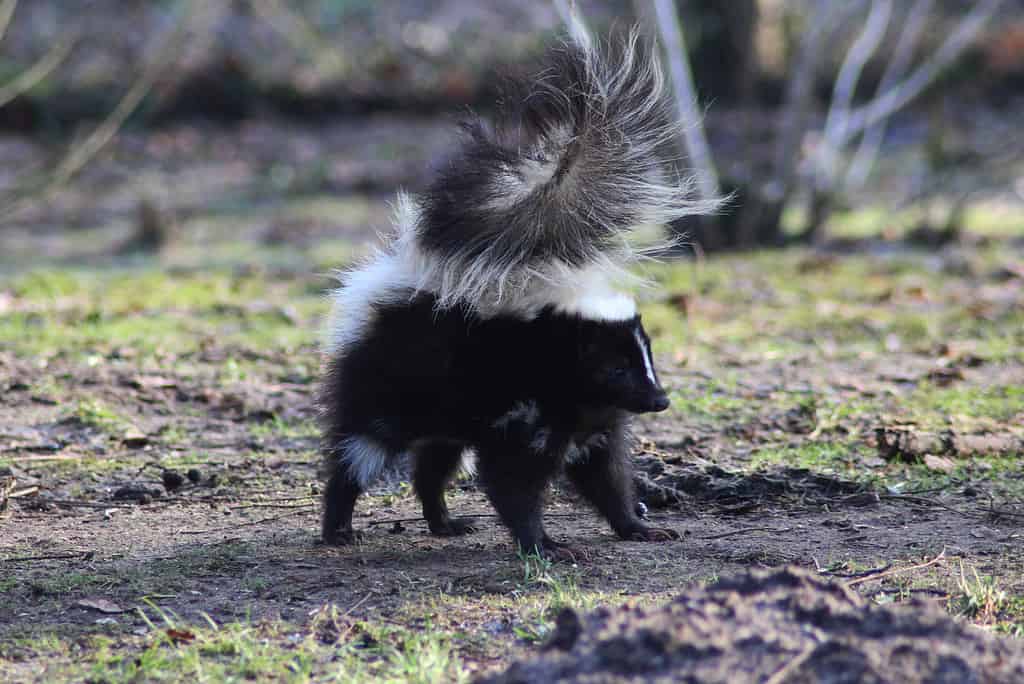Rabies is a viral disease that affects the central nervous system of mammals, but it does not affect reptiles, fish, or birds. Humans can get rabies and pets, and several US wildlife species, including bats and raccoons, can also carry it. So, can skunks have rabies? There are eight native species of skunks in the US, sometimes incorrectly referred to as polecats. They belong to the Mephitidae family and live in open woodland and dense shrubland. As their native habitats are being eroded by human activity, they are increasingly seen in suburban and even urban areas. Therefore, you may encounter a skunk under your shed or in your outbuildings.
Here, we examine whether any of the US species of skunks can have rabies and what you should do if you are bitten by one.
What Is Rabies in Humans?
You get rabies when the virus enters your body and replicates within your cells. Because it is found mainly in the saliva of infected animals, bites are the main transmission route. Some people get infected from the brain or nervous tissue of animals, and you can become infected through scratches or if infected matter enters your eyes or nose. There is more than one strain of rabies, and skunks often carry the north-central skunk rabies virus strain. However, this strain can cross species and potentially infect humans.
Rabies is always fatal in humans if it is not treated. The initial symptoms are fever and a tingling sensation around the bite wound. This is followed by either hyperactivity or paralysis. It can take several months for the signs to start.
How Often Do Skunks Infect Humans With Rabies?

It is unusual for skunks to give humans rabies.
©michael meijer/iStock via Getty Images
It is very rare to contract rabies from a skunk. In the last few decades, there have been three reported cases in Mexico but none in the US. That said, skunks should still be regarded as a potential source of human rabies. Tests conducted during 2021 found 691 infected skunks in the US. The states with the most rabies-positive skunks were Texas, North Carolina, Virginia, Arizona, Massachusetts, and Colorado. As well as the north-central skunk virus strain, they can also carry the bat and raccoon strains of the rabies virus.
Any species of skunk can carry the virus, but the most often positive animals are the striped skunks (Mephitis mephitis) and some spotted skunks (Spilogale spp).
How Can You Tell a Skunk Has Rabies?
You cannot tell whether any animal has rabies just by looking at it. The only way to be sure is by conducting laboratory tests. Also, animals can transmit rabies to you before they start to show symptoms themselves. In general, skunks can begin to act strangely when they have rabies. Because it affects the brain, it also affects their behavior.
Skunks are usually nocturnal, but you may see them out during the day when infected with rabies. Rabid skunks can also appear uncoordinated and move strangely. They may be susceptible to touch or pressure and be highly sensitive to light, noise, or movement.
Having rabies can also make skunks more aggressive, and this makes them more likely to bite people! There are reports of people getting bitten by skunks around their homes or campsites. In theory, you could also contract rabies from a dead skunk, so it is important to keep away from them.
What You Should Do if You Are Bitten by a Skunk

If a skunk bites you, you need immediate medical attention.
©kckate16/iStock via Getty Images
Even though it is rare for humans to contract rabies from skunks, you should always assume that you have been potentially exposed if you are bitten by one. If possible, detain the skunk to be euthanized and tested for the rabies virus. Meanwhile, you need to obtain immediate medical attention. Your wound will be thoroughly cleaned, which may be done immediately using special chemicals that tackle the rabies virus. You will be treated with post-exposure prophylaxis if you have not received a rabies vaccination. This is human rabies immune globulin (HRIG), which will start to fight the virus close to the site of injury.
You will also be given the rabies vaccine and require follow-up doses over the next few days. Cases of potential rabies exposure usually have to be reported to the appropriate authorities.
Summing up: Can Skunks Have Rabies?
Can skunks have rabies? Yes, skunks can carry several strains of the rabies virus and pass it on to you if they bite you. However, very few people have caught rabies from skunks. Animals with rabies can infect you before they start to have symptoms, but skunks with rabies may be out during the day and be more sensitive to touch, noise, and light. They may also be more aggressive. If a skunk bites you, you should assume they could have rabies and get medical attention immediately.
The photo featured at the top of this post is © bobloblaw/iStock via Getty Images
Thank you for reading! Have some feedback for us? Contact the AZ Animals editorial team.





